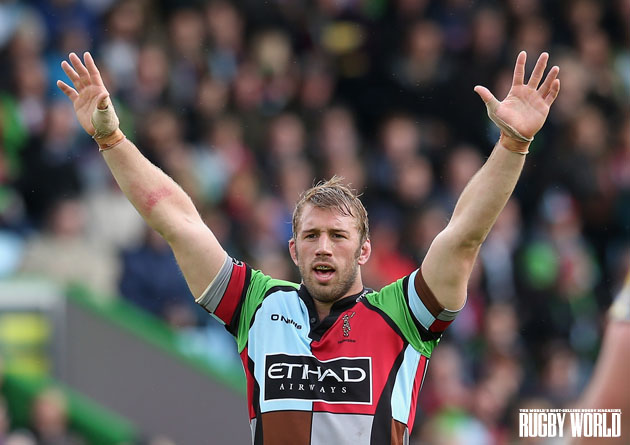The popular view on Chris Robshaw at the start of this season was that he needed to be involved in game-changing moments. Everyone knew his work-rate was phenomenal, but a host of pundits wanted some Hollywood sparkle – a blockbuster try here or there, perhaps a few more pilfers at the ruck.
That view was total rubbish back then and remains total rubbish now. As the captain of Harlequins and England reaches the home straight of another exceptional campaign, it is worth rewinding 11 months to a Heineken Cup quarter-final against Munster at The Stoop that was defined by a tale of two skippers.
There was Paul O’Connell, fresh from a long injury lay-off and utterly inspired, charging around in a rage to almost single-handedly drag his province into the last four.
Then there was Robshaw, devoid of any zip and evidently weary. He was too proud to admit as much in a breathless post-match interview, but the openside was suffering from burnout. After damaging ankle ligaments during a win over Worcester two weeks later, any chance of a Lions tour was gone.
Compare that exhausted outing to what Robshaw produced last Saturday – a talismanic performance featuring 20 tackles, 12 carries and nine passes that led to Bath being ousted 19-16. Before you take breakdown graft into account, those numbers amount to a meaningful involvement every 120 seconds.
At the final whistle, Robshaw had another microphone thrust in his face. This time, he seemed unruffled and calmly articulated how important it had been to retain composure. In truth, the finale to what was effectively a Premiership quarter-final was fraught and frantic, but Quins’ leader remained quietly clinical.
When Robshaw signed a two-year extension last August, Conor O’Shea hailed “an incredible rugby player” and “one of the great leaders of the modern game”. Even from O’Shea, an eternal optimist, that is mighty praise. And the past nine months will only have reinforced his view.
A summer of speculating that Robshaw might struggle to regain a white shirt feels like ancient history. Matt Kvesic, then the most prominent challenger for an openside berth, has endured a tough time with Nigel Davies’ Kingsholm reign collapsing, while England have developed impressively. Their unassuming but effervescent number seven is a perfect symbol of such progress.
Now the third-most capped England captain behind only Will Carling and Martin Johnson – a fairly striking statistic – Robshaw admits to learning on the job. A savage mauling in Cardiff evidently provided a poignant lesson.
Since then, his Test form has been excellent.
Michael Hooper didn’t get a sniff at the breakdown when the Wallabies came to Twickenham, while the All Blacks were bullied for an hour a fortnight later. Although overrun by Yannick Nyanga in Paris, Robshaw nevertheless enjoyed a fine Six Nations.
As ever, he excelled in unglamorous aspects. According to Stuart Lancaster‘s analysts, he was England’s top tackler in each game, felling 85 attackers over the tournament with a high of 23 against Ireland. In all but two matches, the 27 year-old hit more than 30 rucks. For reference, Sam Warburton hit 27 in 66 minutes during the second Lions Test Down Under last June – widely considered to be an exemplary showing.
Robshaw was also an undervalued carrier and transferred the point of contact with deft pop-passes on numerous occasions, ensuring burlier runners barreled over the gainline past unbalanced defenders.
Again, he has proved that glitz is optional. A perfectly-weighted chip for Matt Hopper’s miracle try in January’s defeat to Clermont is just about the most extravagant thing Robshaw has done on a rugby pitch. That sublime piece of skill, plus his first two international five-pointers, does not constitute a season with “more game-changing moments”. Robshaw doesn’t need one instant to alter the flow of a match – it’s a cumulative process.
His influence is so important for Quins. He could do with amending his manner of speaking to referees – as Wayne Barnes noted on Saturday – but it is no coincidence that a return to club colours has coincided with five consecutive league victories, each a do-or-die situation.
This weekend, Mike Brown, Danny Care, Dave Ward, Nick Easter and co. bring their fast, loose approach to Allianz Park and will be difficult to stop on such a pacey surface. Saracens’ ‘destroy and enjoy’ defence, devised by Andy Farrell and cultivated by Paul Gustard, needs to be as potent as it was against Clermont.
Robshaw goes head-to-head with Jacques Burger, the Premiership’s warrior-king and architect of the immense collective effort at Twickenham that blew Clermont out of the Heineken Cup. It is an intriguing tussle.
Interestingly, at least two broadsheet reporters present to see Harlequins beat Bath used the same adjective to describe Robshaw – “relentless”. Far fresher than last year, he is well positioned for another prominent display.
Just as well, too. Should Harlequins fail to conquer Allianz Park, Rosbhaw’s consolation prize is a trio of duels with Richie McCaw. The challenges keep coming.
To read our exclusive interview with England centre Manu Tuilagi, see the June 2014 issue of Rugby World, on sale until 2 June.








